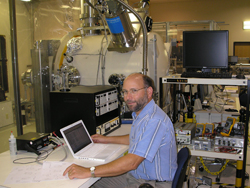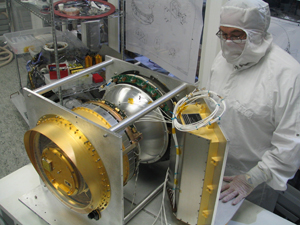Meet the IBEX Team: Stephen Fuselier

Literally and figuratively, the work Dr. Stephen Fuselier manages for the IBEX mission is coming together. A senior manager at Lockheed Martin Advanced Technology Center, Stephen supervises a team of 45 scientists and engineers in the space physics department. Together with other IBEX team members, they designed, constructed, and tested the IBEX-Lo sensor, which will detect particles to help scientists create the first map of the Solar System's boundary.
Right now, the assembly and testing of the sensor is complete, and the team's hard work has paid off. "All the pieces have finally come together for IBEX-Lo. We've spent the last month doing calibration - putting it in a vacuum chamber and seeing if the sensor responds close to the way we predicted. It's a lot of work, but it's very gratifying when all goes well, which it did," Stephen said.
Testing the IBEX-Lo sensor is a complicated process that takes place in Switzerland, where the scientists have over ten years of experience creating the low-energy, neutral atoms similar to those that IBEX-Lo will detect in space. To be safe, the team even disables part of the detector and puts it through the same tests to see if it malfunctions in a way they expected. "It sounds kind of crazy, but you want to know that when you operate the sensors you're seeing what you expect, and when it's not working, you see something consistent with it not operating properly. Doing something wrong and getting the wrong answer helps you understand what the right answer should be," Stephen said.
The testing does not end when the IBEX-Lo team leaves Switzerland, either. "The testing creates a lot of data, so when you get back, you and the IBEX team have to make computer plots, and discuss to see if the count rates you see make sense compared to what we expected to see," Stephen said.
Stephen says that the best part of his job building spaceflight instruments like IBEX-lo is discovering that they work properly. The successful tests in Switzerland provided him with one of those moments. "That was tremendously satisfying, because if it doesn't work, you spend weeks figuring out what went wrong," he said.
As a plasma physicist who works in space science, Stephen comes very close to achieving his childhood dream of being an astronomer. "I grew up in Louisiana, outside of New Orleans, and I have always been in interested in science. Since third grade I wanted to be an astronomer, and I followed that path up to and through college. I ended up almost being an astronomer. Space physics is kind of like astronomy," he said.
As a third-grader, Stephen was inspired to study astronomy by reading and following the Apollo missions. "I read books about people who discovered something about the Universe, and the excitement of discovery. To learn something that mankind didn't know before and to be able to communicate it to other people was exciting. And I was growing up in the space age, and paid very close attention to the Apollo program. Landing on the Moon left deep impressions on me and really directed me," he said.
His desire to pursue an astronomy degree evolved in college. "As an undergraduate I said, 'Maybe I'll get a degree in physics, and take all the astronomy classes.' So when I went to graduate school, I got interested in space plasma physics rather than astronomy," Stephen said.
As an adult, Stephen was further inspired to pursue a career in space science while working as a graduate student teaching assistant for James Van Allen, the famous space scientist, at the University of Iowa. "He was humble, extremely intelligent, and enjoyed telling stories, both good and bad, about working in the field. It was inspiring and quite enjoyable," he said.
Stephen's experience as a graduate student gave him the foundation to face the challenges of working in space science. "In grad school I studied physics and space plasma physics, and the best part about the physics education is that it taught me how to solve a problem. It wasn't memorization, but a general process of what to do when you encounter a problem. In space, you encounter just about anything," he said.
When he began working in space science, Stephen realized that the complexity of designing, building, and operating equipment in space means that the mission's success depends on communication and teamwork. "When I became a scientist, I realized I had to improve my writing skills, because communication is really important. A scientist doesn't go off and discover things all by themselves, especially for a space mission. You have to rely on a lot of very smart people to get to the place to make the discovery. So you have to learn some people skills to work with other technicians, engineers, and scientists. It's a really important aspect because without it you won't get there," he said.
Those people skills include being open to all ideas and suggestions, no matter how silly they sound at the time. "Because this is a very complex business, you never dismiss comments from somebody else because you think that they're wrong. Try to really evaluate what people say, and always realize that you could be wrong on something, and just accept that," Stephen said, "Always be open to new ideas and new things to learn because that's the only way you make progress."
Stephen carries his love of learning new things into the rest of his life. For the last 20 years, he has taken French and German lessons. "It's fun to learn about other cultures and to immerse yourself in the language," he said. He also enjoys traveling, swimming, hiking, fishing with his dad, and spending time with his wife and kids. His son is in the army, learning to fly unmanned aircraft, and his daughter is a junior in high school.
One of Stephen's biggest joys occurs when a mission he has worked on first produces data. "For me, the enjoyment is when you look at new data coming back from a new mission, and say, 'Nobody's seen this before.' Especially for IBEX, it's going to be fantastic because we're really pushing the envelope of what's been seen. The first image we get back is going to be revolutionary. What makes the field interesting is the thrill of discovery, and you're always going to find something that theorists haven't predicted," he said.
